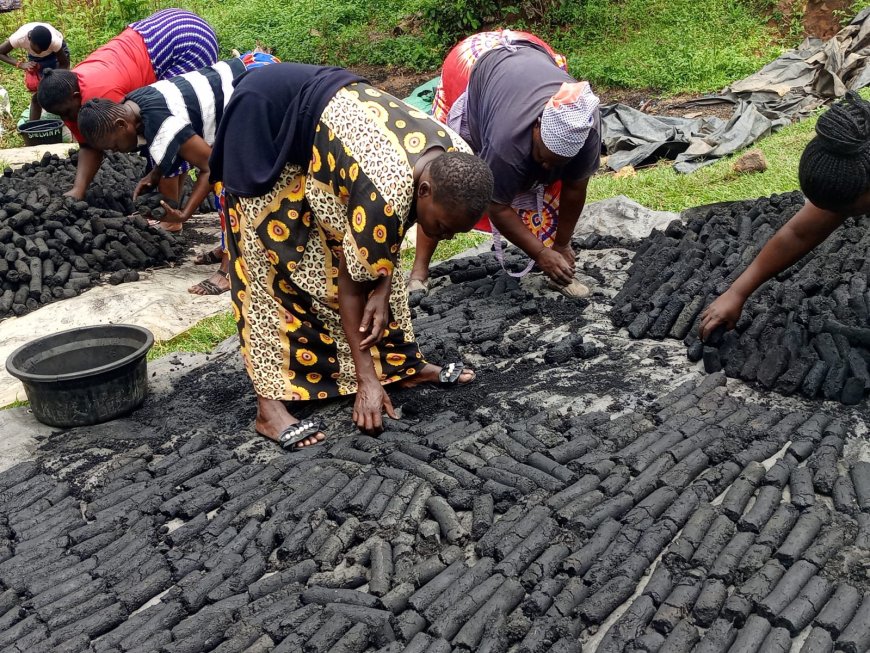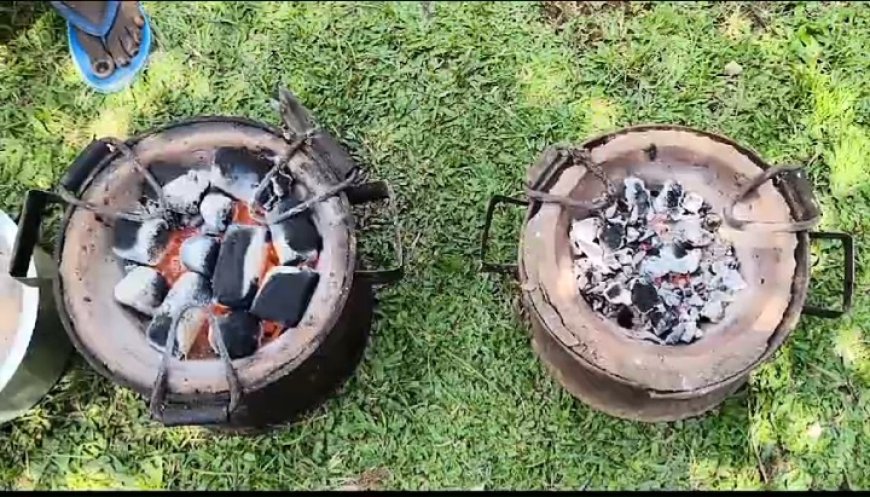Green Innovations: Kakamega Women Turn Trash into Clean Energy

By Seliphar Machoni
In the outcasts of Kakamega town in the Emusonga area, Sheiywe ward in Kakamega County, the New Recada Women Group gather under the shade of a mango tree. Their laughter and chatting are heard through the air as they diligently work on their latest project, turning discarded paper waste into briquettes.
Kakamega county, known for its lush forests and rich culture, grapples with waste management and deforestation.
With rapid urbanization and population growth, especially in Kakamega town, the demand for charcoal has soared, leading to increased pressure on the region's forests.
Irene Nasimiyu, the Founder of the New Recada Women Group, says they came together as women, with a few men, to solve environmental problems, prevent deforestation, and mitigate climate change.
"Some of the things we as a group would like to solve in the community through our project is to make sure our environment is clean. We advocate for a clean environment because we use waste materials like papers, sweet potato peelings, banana peelings, and sawdust to make the briquettes," Irene says.
Irene explains that the briquette-making project has helped mitigate climate change in Kenya by preventing the cutting down of trees.
Shufa Auma, a member of the group, explains the process of making briquettes. She says it is not easy, but as a group, they have been able to conserve the environment and mitigate climate change.
"To make briquettes, we go around town and communities collecting paper waste. We then soak them with water and leave them to soften. We mix the soaked papers with charcoal dust, molasses, and cow dung. The cow dung makes the mixture sticky, similar to ugali, a local dish. We shape the mixture using petroleum jelly tins/bottles that we collect from disposals. After sun drying the briquettes, they are ready for use," Auma explains.

Briquettes making process
Auma also mentions that these briquettes do not produce smoke and last longer compared to normal charcoal.

Jiko 1: Using Briquettes Jiko 2: Traditional Charcoal
Irene highlights the health effects of using normal charcoal, stating that the process of burning it can cause lung cancer, throat cancer, and other illnesses due to the smoke produced.
According to the World Health Organization, in 2020, 3.2 million people died prematurely from illnesses caused by household air pollution due to incomplete combustion and charcoal.
Additionally, over 237,000 children under the age of 5 died as a result. Lower respiratory infections accounted for 21% of deaths, with household air pollution nearly doubling the risk for childhood LRI and being responsible for 44% of pneumonia deaths in children under 5. It also contributes to acute lower respiratory infections in adults and 22% of adult pneumonia deaths.
Around 6% of deaths are due to lung cancer, with approximately 11% of lung cancer deaths in adults attributed to exposure to carcinogens from household air pollution caused by using kerosene or solid fuels such as wood, charcoal, or coal for household energy needs.
Christopher Amutabi, Assistant Director of Eco2librium company, and an environmental expert, states that briquettes have a lower carbon footprint compared to traditional charcoal or firewood.
"The production of briquettes involves compressing waste materials, which releases fewer greenhouse gasses compared to open burning of wood for charcoal. Using waste materials for briquette production also avoids carbon emissions associated with waste decomposition or incineration," he explained.
Irene explains that briquettes have had a positive impact on women's health since they are often affected by the smoke from firewood and charcoal.
"Women typically perform household chores such as cooking and collecting firewood, making them bear the greatest health burden from using polluting fuels and technologies at home," she explained.
She emphasizes that briquettes promote clean energy, reduce coughing, and ensure a smokeless environment, benefiting both health and the environment.
The World Health Organization emphasizes the importance of expanding the use of clean fuels and technologies to reduce household air pollution and protect health.
Mr. Amutabi explains that briquettes contribute to reducing air pollution and improving indoor air quality, particularly in communities reliant on traditional cooking methods.
"Most households in Kakamega rely on traditional cooking methods. When we compare the poorly ventilated stoves, briquettes produce less smoke, leading to a healthier environment and reduced respiratory illnesses," says Amutabi.
Through their efforts, the group has significantly reduced the amount of paper waste ending up in landfills or burned indiscriminately, releasing harmful toxins into the air.
By providing an alternative to traditional charcoal production, they are also helping to preserve Kakamega's precious forests and mitigate the effects of climate change.

“We live in a clean town and our communities are clean because we recycle paper waste to make briquettes. We encourage others to plant trees and use briquettes instead of charcoal to protect the rainforest," says Auma.
According to Amutabi, converting paper waste into briquettes helps address climate change by reducing deforestation and promoting sustainable land use practices. "It also provides alternative livelihood opportunities, reduces poverty, and improves resource efficiency."
However, there have been obstacles. Limited access to affordable machines and lack of marketing expertise have been significant challenges, according to Irene.
"We lack proper equipment to produce a large number of briquettes. We currently produce a small number manually, which takes a lot of time. With machines, we can produce more. Increased production will help with social marketing. We also faced skepticism from community members resistant to change," said Irene.
The group wants to attract both local and international investors to benefit women and continue expanding the project.
"We want to have customers from other countries and target schools using firewood for cooking. We want to reach out and help them avoid the risks associated with using firewood," says Irene.
While the group addresses waste management and deforestation, Amutabi emphasizes the need for responsible sourcing of materials and proper waste sorting and recycling practices for sustainability.
The group's initiative aligns with multiple SDGs, demonstrating the interconnectedness of environmental sustainability, poverty alleviation, and economic development.
SDG 7 focuses on affordable and clean energy, and the group promotes this through the use of briquettes as an alternative fuel source. This is important for sustainable development and poverty reduction. SDG 11, on the other hand, aims to create sustainable communities by reducing waste, deforestation, and improving air quality through cleaner cooking fuels. SDG 12 emphasizes responsible consumption and production, which the group aligns with by converting paper waste into briquettes, reducing waste generation and maximizing resource efficiency.
Additionally, the group's activities contribute to SDG 13 on climate action by mitigating deforestation and reducing greenhouse gas emissions. SDG 15, focusing on life and land, is supported by the group's efforts to reduce pressure on forest resources and promote reforestation through sustainable land management practices.
Despite the challenges faced, the impact of the group's work is undeniable.
Flora Biketi, a group member, shares how being part of the project has allowed her to learn and grow through various trainings and workshops.
"Because of this group, I have been able to attend trainings and workshops. I have learned a lot in those sessions, which have empowered me. Initially, I used to stay at home idling with nothing to do, but currently, the project has made me busy," Biketi narrated.
Brison Museve, a disabled member responsible for marketing, educates people about the benefits of briquettes and the importance of conserving the environment.
Local resident Mary explains how the affordable briquettes not only save her money but also burn longer and produce less smoke.
Sharon Ambani, an environmentalist, believes that the group's initiative is an innovative method of clean energy, rather than resorting to the traditional practice of going to the forest and cutting down trees.
"This is a better innovation that should be embraced by policy makers and stakeholders in order to protect and conserve our Kakamega forest. The initiative also promotes the adoption of a circular economy, which is crucial in addressing the challenges of waste management, particularly the widespread presence of paper waste. Such initiatives help in converting waste materials into energy," she explains.
Looking ahead, the group is eager to expand their operations and reach more communities, teaching them how to make and use briquettes. They hope to partner with the county government and other organizations to scale up production, improve distribution channels, and advocate for sustainable waste management policies in Kakamega County.
This initiative has inspired the Director of Environment and Climate Change in the county, Antony Munanga, who sees the project as aligned with their goals of promoting environmental sustainability and empowering local communities.
"In the coming years, we are committed to supporting these efforts through funding, technical assistance, and policy advocacy. We recognize the importance of scaling up initiatives like this to achieve our environmental targets and improve residents' quality of life. By reducing deforestation, promoting alternative fuel sources, and empowering local communities, the project contributes to the county's objectives of conserving natural resources, mitigating climate change, and improving livelihoods," Munanga explained.







